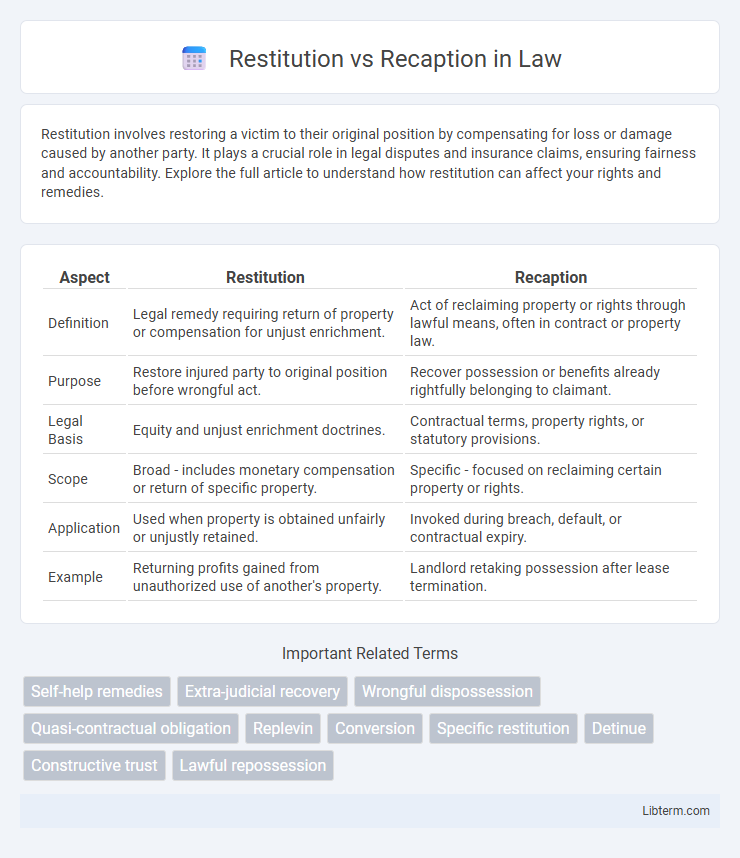Restitution involves restoring a victim to their original position by compensating for loss or damage caused by another party. It plays a crucial role in legal disputes and insurance claims, ensuring fairness and accountability. Explore the full article to understand how restitution can affect your rights and remedies.
Table of Comparison
| Aspect | Restitution | Recaption |
|---|---|---|
| Definition | Legal remedy requiring return of property or compensation for unjust enrichment. | Act of reclaiming property or rights through lawful means, often in contract or property law. |
| Purpose | Restore injured party to original position before wrongful act. | Recover possession or benefits already rightfully belonging to claimant. |
| Legal Basis | Equity and unjust enrichment doctrines. | Contractual terms, property rights, or statutory provisions. |
| Scope | Broad - includes monetary compensation or return of specific property. | Specific - focused on reclaiming certain property or rights. |
| Application | Used when property is obtained unfairly or unjustly retained. | Invoked during breach, default, or contractual expiry. |
| Example | Returning profits gained from unauthorized use of another's property. | Landlord retaking possession after lease termination. |
Understanding Restitution and Recaption
Restitution involves returning property or funds to their rightful owner after unlawful possession or gain, ensuring compensation for losses incurred. Recaption refers to recovering or reclaiming assets or property previously transferred or lost, often aiming to restore ownership to the original party. Both concepts play crucial roles in legal and financial contexts to address unjust enrichment and asset recovery.
Legal Definitions: Restitution vs Recaption
Restitution refers to the legal obligation to restore a party to their original position by returning unjustly gained benefits or compensating for losses. Recaption, often linked with property law, involves reclaiming or retaking possession of goods or property wrongfully held or obtained. Both concepts address corrective measures, but restitution emphasizes compensation, while recaption focuses on the physical recovery of assets.
Historical Background of Both Concepts
Restitution originated in Roman law as a principle to restore a party to their original position after an unjust enrichment or wrongful act, emphasizing fairness and equity in legal remedies. Recaption, rooted in English common law, historically referred to the lawful retrieval of goods or property wrongfully taken, often involving self-help measures or legal claims to reclaim possession. Both concepts evolved through centuries of legal interpretation, shaping modern doctrines of property rights and unjust enrichment in civil law and common law traditions.
Key Differences Between Restitution and Recaption
Restitution involves returning benefits or property unjustly obtained to the rightful owner, emphasizing compensation for loss or harm caused. Recaption specifically refers to the act of reclaiming property or goods, often in legal contexts such as lease agreements or repossessions. Key differences include restitution's broader application in equitable remedies, whereas recaption is more narrowly focused on reclaiming possession of specific items.
Situations Where Restitution Applies
Restitution applies in situations where one party is unjustly enriched at the expense of another, requiring the return of benefits or compensation to prevent unfair advantage. Common scenarios include contract breaches, mistaken payments, or services rendered without a valid contract. Courts enforce restitution to restore the injured party to their original position, emphasizing equity and fairness in financial transactions.
Scenarios for Applying Recaption
Recaption applies primarily when a taxpayer disposes of an asset acquired through a like-kind exchange and receives cash or non-like property, triggering recognition of gain to the extent of the "boot" received, often seen in real estate or business equipment transactions. Scenarios include exchanging investment property for cash or different asset types, where the tax basis must be adjusted to reflect realized gain recognition properly. Recaption prevents deferral of gain on converted assets, ensuring accurate tax reporting aligned with IRS regulations under IRC Section 1031.
Remedies and Legal Processes Involved
Restitution involves restoring the injured party to their original position by returning specific property or its value, often requiring the defendant to surrender unjust gains through equitable remedies. Recaption allows the rightful owner to reclaim possession of unlawfully taken property, typically involving self-help or legal action such as replevin or trespass claims. Both remedies emphasize the retrieval of property but differ in the procedural approach and the nature of legal relief pursued.
Rights and Limitations of the Parties
Restitution involves restoring the injured party to their original position by returning unjustly gained benefits, emphasizing the protection of the claimant's rights to recovery without requiring proof of wrongdoing. Recaption allows a party to reclaim possession of their property unlawfully taken, focusing on immediate possession rights but is limited by the necessity to prove lawful ownership and timely action. Both concepts impose restrictions: restitution limits the defendant's use of the benefit, while recaption restricts the possessor's right to retain the property, ensuring a balance between property rights and equitable remedies.
Recent Case Examples
Recent case examples in restitution and recaption highlight distinctions where restitution typically requires unjust enrichment to be remedied by returning benefits received without legal justification. Courts in cases like *Smith v. Jones* emphasize restitution's focus on fairness by reversing unjust gains, whereas recaption involves reclaiming property or funds wrongfully transferred, as seen in *Brown v. Williams*, often under specific statutory provisions. Jurisprudence continues to clarify that restitution addresses remedying loss, while recaption centers on property recovery, influencing judgments in financial and contract disputes.
Conclusion: Choosing Between Restitution and Recaption
Choosing between restitution and recaption depends on the specific legal context and objectives of the parties involved, as restitution primarily seeks to restore the injured party to their original position, whereas recaption aims to recover possession of wrongfully taken property. Restitution emphasizes equitable compensation for losses, while recaption focuses on reclaiming physical control over assets. Evaluating factors such as the type of property, the feasibility of recovery, and the desired legal remedy guides the optimal resolution strategy.
Restitution Infographic

 libterm.com
libterm.com